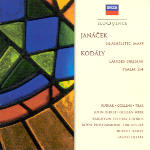Rudolph Kempe leads a grand and ceremonial reading of Janácek’s Glagolitic Mass with tempos tending to the slow side, imparting a feeling of solemnity to the proceedings. Not a solemnity of the dull type–this is no Brahms German Requiem–but one that combines religious fervor and carnal intensity. Kempe puts the Royal Philharmonic through its paces, especially in the Credo and Processional. There’s much excitement from the chorus and soloists as well. Teresa Kubiak sings with full-thoated passion in the Gloria, though tenor Robert Tear, however passionately committed, lacks a true Slavic timbre. John Birch adroitly tackles the delirious organ solo. Rafael Kubelik’s blistering performance on Deutsche Grammphon remains unchallenged in its thrillingly dramatic execution, but Kempe’s is a fine budget-priced alternative. And it is made all the more attractive by the inclusion of Kodály’s mystical Laudes Organi and Psalm 114 for organ and chorus, winningly realized by Gillian Weir and the Brighton Festival Chorus under Laszlo Heltay. The 1970s Decca recordings have transferred well, though the Janácek has less clarity than we are accustomed to today.
































